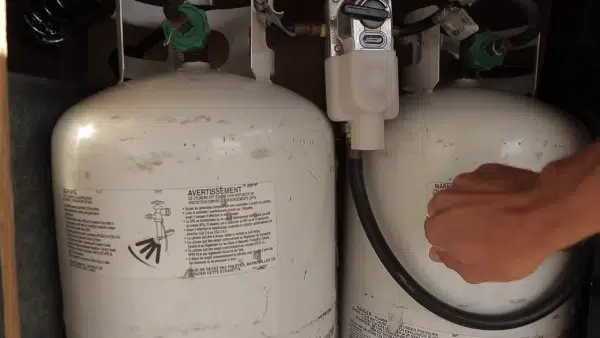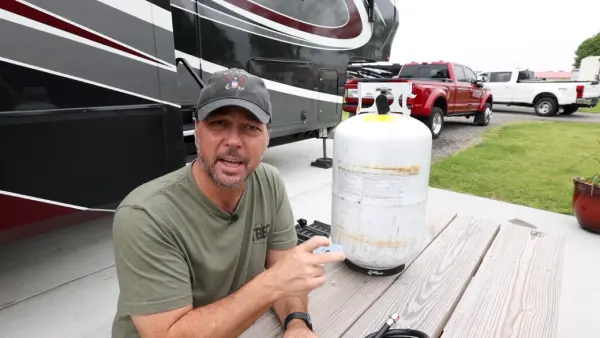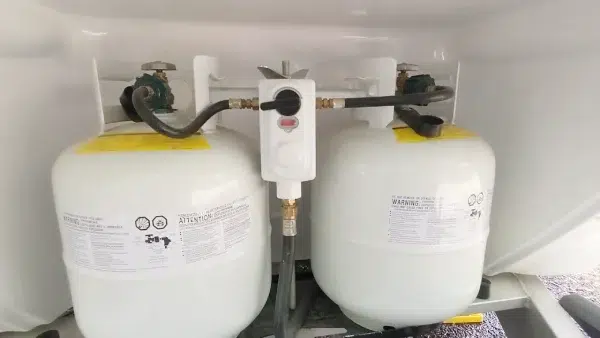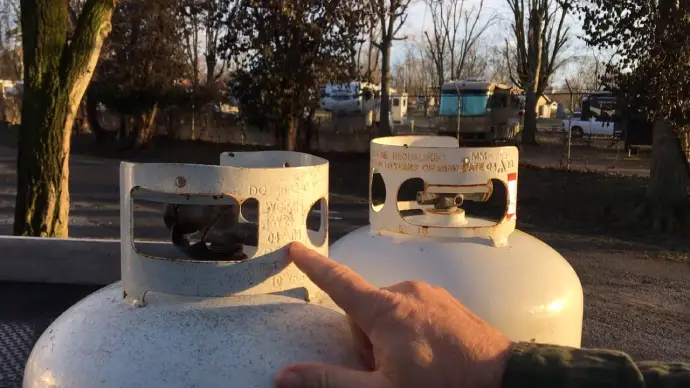Last Updated on May 18, 2023
If you’re an avid RV enthusiast, you probably know that propane is one of the most vital resources on your travels. It powers your stove, your fridge, and even your furnace. But do RV propane tanks need to be recertified?
You must know the answer, as it is a legal requirement in most states. All portable propane cylinders regulated by the Department of Transportation (DOT) must be recertified 5 or 10 years after manufacture, regardless of their use. Propane cylinders in this category include Types 4B, 4BA, 4BW, and 4E.
Throughout this article, we’ll dive into everything you need to know about recertifying RV propane tanks. So let’s get started.
Do RV Propane Tanks Need To Be Recertified: 3 Factors

The recertification process for RV propane tanks is an essential step in ensuring the safety and functionality of your propane tank. The process typically involves an inspection by a professional inspector, testing for leaks and pressure, and obtaining a new certification sticker.
01: Inspection by a Professional Inspector
When it comes to ensuring the safety of your RV propane tank, it is important to have it inspected by a professional inspector. These inspectors are trained to identify potential hazards and ensure that your propane tank meets all safety standards.
It is important to note that not all inspectors are qualified to inspect RV propane tanks. Look for an inspector certified by the National Propane Gas Association (NPGA) or another reputable organization.
By having your RV propane tank inspected by a professional, you can know that it is safe and up-to-date with all regulations. It is recommended to have your propane tank inspected at least once every five years or as local regulations require.
Ignoring the need for an inspection can lead to serious safety hazards and risks. In addition, failing to comply with regulations can result in legal implications and fines. So schedule regular inspections with a qualified professional to keep your RV propane tank in top condition.
02: Testing for Leaks and Pressure
Regarding RV propane tanks, recertification requires testing for leaks and pressure. This step is crucial to ensure the tank is safe for use and meets all safety standards.
During the inspection, a professional inspector will check for any leaks in the tank’s valves, fittings, or hoses. They will also test the pressure inside the tank to ensure it falls within acceptable limits. This helps to prevent any potential hazards that could arise from a faulty tank.
The testing process involves using specialized equipment to measure the tank’s pressure accurately. The inspector will connect the equipment to the tank’s valve and slowly increase the pressure while monitoring it closely. Repairs or replacements may be necessary if leaks or pressure exceeds safe levels.
03: Obtaining a New Certification Sticker
Once the tank has been inspected and pressure tested, a new certification sticker is affixed. This sticker must be kept in place on the tank at all times. It proves that the tank meets safety standards and is suitable for use.
It is important to note that tanks must be regularly inspected and tested according to local regulations. This helps ensure that tanks remain in safe working condition and do not pose a risk to people or property.
Following these procedures can help keep yourself and others safe while using propane storage tanks.
What are the reasons for propane tank recertification in an RV?

There are several reasons why RV propane tanks need to be recertified. Without proper recertification, a propane tank can become dangerous and pose a risk of fire or explosion. Here are some of the reasons why you should have your RV propane tanks recertified:
Safety
Propane tanks have a limited lifespan and may become unsafe to use after a certain amount of time. Recertification helps ensure that the tanks are still safe to use in an RV and can prevent accidents from occurring.
Regulatory Compliance
The law requires recertification to ensure that propane tanks meet safety standards and regulations set by government agencies such as the Department of Transportation (DOT) and the Occupational Safety and Health Administration (OSHA).
Liability
Failing to recertify RV propane tanks can result in liability issues for individuals and businesses. If an accident occurs due to a propane tank that was not properly recertified, the responsible party may be held liable for damages.
Insurance Requirements
RV propane tanks may need to be recertified for insurance coverage to remain valid. Failure to comply with insurance requirements may result in policy cancellations or higher premiums.
Peace of Mind
Recertification provides peace of mind for those using RV propane tanks. Knowing that the tanks have been inspected and deemed safe for use can alleviate concerns about potential accidents or malfunctions.
Can you get horizontal propane tanks for the trailer recertified?
Propane tanks used in RV trailers and other recreational vehicles need to be requalified or replaced every few years, depending on their condition, type, and previous requalification method.
Regarding horizontal RV propane tanks used in trailers, they must also undergo the same requalification process as vertical tanks. The process involves examining the tank’s condition, inspecting its markings and serial number, and ensuring it meets the relevant safety standards.
If the tank meets these standards, it can be requalified, which involves testing it using specific procedures and equipment. After passing the tests, the tank will be marked with a new certification date, indicating that it is safe for another five or ten years, depending on the tank type.
It is important to note that propane tanks that do not pass the requalification tests must be disposed of safely and replaced with a new one. Trying to use an expired or damaged propane tank can lead to leaks, fires, or explosions, putting your safety and your property at risk.
What are the transportation safety administration regulations for RV propane tanks?
The Transportation Safety Administration (TSA) regulates the transportation of propane tanks, including those used in RVs. The TSA has specific regulations that must be followed to ensure safe transport of propane tanks.
These regulations include properly labeling the tank, securing the tank during transport, and ensuring that the tank is not damaged or leaking.
When transporting an RV propane tank, it is essential to follow these regulations to avoid any safety hazards or risks. The tank should be properly secured in a well-ventilated area away from heat sources and open flames. Additionally, the tank should be labeled with its contents and weight.
If you are traveling with your RV, it is important to know that some states have additional regulations regarding propane tanks. For example, California requires all propane tanks to be recertified every five years regardless of their age or condition.
Who is responsible for getting propane tanks recertified for RVs?

As the owner of the propane tank in your RV, it is your responsibility to ensure that it is recertified regularly. This is important not just to comply with legal requirements but also to ensure your own safety and that of others around you.
The National Fire Protection Association (NFPA) establishes standards for propane tanks, requiring periodic recertification of tanks used in RVs. The recertification process involves inspection of the tank, replacement of any defective parts, and testing to ensure that the tank is still safe to use.
It is important to note that the responsibility for recertification does not fall on the RV manufacturer or dealer. As the owner, it is up to you to ensure that your propane tank is properly maintained and up to code.
Can I still use an RV propane tank that has not been recertified?
Using an RV propane tank without recertification is illegal. This is because a propane tank that is not recertified may not meet the safety standards set by the NFPA.
Using a propane tank that does not meet these safety standards can lead to various dangerous situations, including leaks, fires, and explosions. These incidents can result in serious injuries, property damage, and even death.
To avoid these risks, it is crucial to have your propane tank recertified regularly. If you are unsure whether your propane tank is up to date on its recertification, it is recommended that you have it inspected by a certified professional.
Protect Yourself and Others with Regular RV Propane Tank Recertification
Recertifying your RV propane tanks is a crucial step in ensuring the safety of yourself and others around you. The age of the tank and TSA regulations play a significant role in determining when a professional should inspect your tank.
Testing for leaks and pressure is an essential part of the recertification process, and the frequency of inspections depends on expiration dates and renewal periods. Not recertifying your RV propane tank can lead to safety hazards, legal implications, and fines.
Therefore, it is vital to schedule regular inspections to avoid any potential risks. By doing so, you can rest assured that your RV propane tank is in good condition and ready for use whenever you need it.



